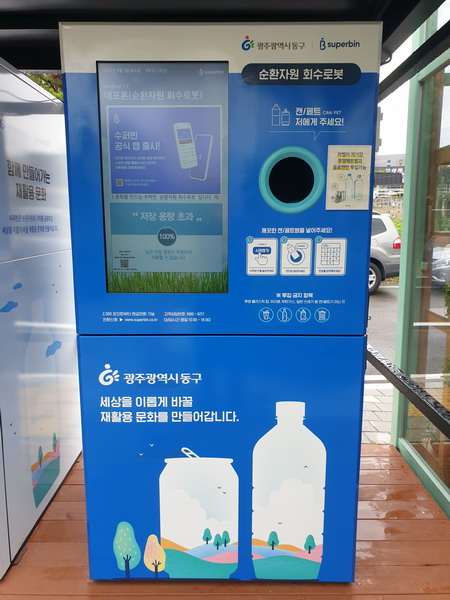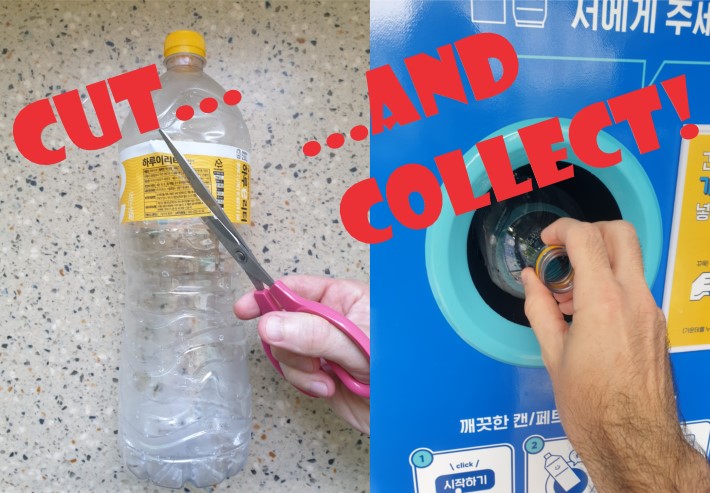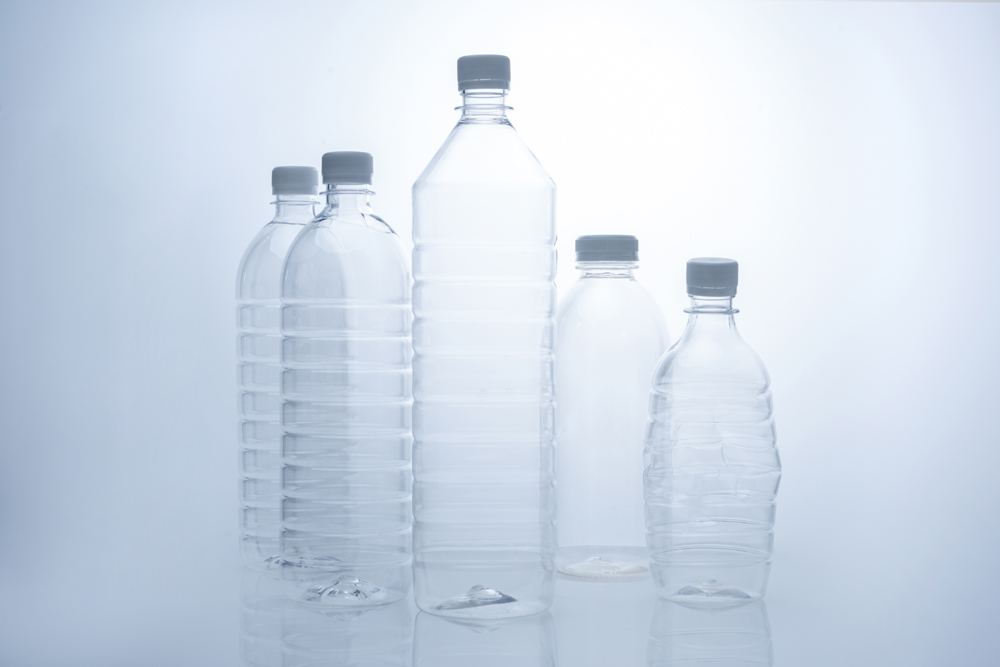The Rise of SuperBin
By William Urbanski
When I was a boy in Canada, certain convenience stores had marvelous machines outside that resembled giant slot machines. Inserting empty recyclable aluminum pop cans into a special slot would activate the reels of the slot machine, and if they came up as a jackpot, you would win a certain prize like an ice cream or another can of pop. Besides unwittingly grooming adolescents to become future gamblers, these machines also got kids excited about recycling, to say the least. As I recall, I was not the only kid on my soccer team who begged his mom to take him to the recycling machine with the faint hope of winning a sugary snack.
This initiative took place roughly in the early 1990s, just around the time that Canada began to ramp up its domestic recycling program as the country as a whole was coming to terms with the fact that recycling was not just a nice, optional thing to do, but an absolute necessity. In the last ten or so years in Korea, I have seen some big improvements in recycling programs and generally a greater overall awareness of the importance of the three Rs (recycling, reducing, and reusing), but after moving to a new area of the city, I am happy to report that the future of beverage container recycling is now because SuperBin has arrived in Gwangju.
Pretty, Pretty Please, Do Not Ever Throw a Bottle in the Garbage.
Around the world, there are many interesting systems that encourage people to never throw away a bottle, and I would like to talk about two in particular: Ontario, Canada, and Germany. In Ontario, all alcohol bottles can be returned to a retailer for a refund that ranges between ten and twenty-five cents. Given the Canadian tendency to consume, ahem, bountiful amounts of booze, these refunds add up so quickly that to toss bottles away (or more aptly, place them in the recycling bin) instead of bringing them to the store is literally throwing money away. Besides ensuring that virtually all alcohol bottles are brought back to be used again, this has some interesting social ripple effects. One positive one is that school classrooms and often sports teams (among other groups) routinely hold “bottle drives” in which kids go around asking for people to donate their empty bottles. After the bottles are refunded, the money is used for school supplies, jerseys, or whatever.
On the other side of the social spectrum, certain individuals use recycling days (the days on which households put their recyclable materials by the road so that they will be collected) to walk the streets collecting booze bottles as a means to earn some quick cash. This may sound like a hard way to make money, but if done properly, it is not difficult to collect a hundred beer cans, which equals a quick ten bucks. I even knew one garbage man who set aside all the booze bottles people would throw away and at the end of his shift would stop by the store, return them, and make himself and extra couple of dollars. Brilliant! On a side note, some cities, including my hometown, actually have “anti-scavenging laws” to discourage this kind of behavior because it is seen as an invasive nuisance. More on that later.
Germany takes it a step further by offering refunds on all plastic, glass, and aluminum beverage containers. For plastic and aluminum products, an individual just has to take the empties into a grocery store, insert them into a machine and – voila! – they get a coupon that can be redeemed for cold, hard cash or used as a discount against a grocery purchase. What I really like about this system is that the deposit on plastic bottles is quite high at 25 cents (in Euros, of course). In some cases, the deposit is even higher than the beverage inside! What this means is that if you bring back just four measly pop cans, you just earned yourself a Euro. Needless to say, you do not see many plastic cans or bottles in the garbage in Germany. In fact, one summer day in Berlin when I refused to give money to a panhandler, he practically demanded the plastic bottle I was holding, because he knew how much money it was worth! Unfortunately for him, I also knew how much it was worth and kept it.

Visit www.superbin.co.kr to download the app and find out where.
Domestic Recycling in Gwangju
Until recently, there were relatively few options for disposing of plastic bottles and aluminum cans in Gwangju. Those who live in apartment buildings generally have a recycling station where papers, metal, plastic, and cardboard are separated into appropriate bins. For the many people who do not live in one of these well-managed and organized apartments, the best option is to collect recyclable materials into some sort of bag and put it by the side of the road on recycling day. Both of these systems work well enough but it is hard to deny that there are countless bottles and cans that find their way into garbage cans anyway. Clearly, the message that recyclable materials should never, ever get mixed with garbage has not hit home quite yet. Enter SuperBin: This clever system, based around devices resembling vending machines, not only provides another option to recycle but also incentivizes it by giving points that can be redeemed for cash.
Here is how it works.
First of all, a user has to download and register with the SuperBin app. This process is very simple and basically just requires providing a phone number. Then, a user has to take some bottles or aluminum cans to a SuperBin machine and enter them one by one. When all the empties are deposited, the user just has to punch in their phone number and the points are registered to their app. Using the machines is very easy, intuitive, and even kind of fun, as there is a certain satisfaction with seeing how many points you can collect. The other fantastic thing is that, at least at the SuperBin by my house, there is a booth with staff members who are eager to help. This easy-to-use system is already proving extremely popular to the point that the machines have on more than one occasion become too full! (Incidentally, when this happened to me, the staff members just took my number and bottles, and then put them in the machine after it had been emptied out).
The really interesting this about this system is what happens to the bottles after they have been collected by the machines. The SuperBin company makes sure these materials are recycled properly and are turned into other consumer goods. Overall, I would give this system an enthusiastic two thumbs up. It encourages recycling, is easy to use by people of all walks of life, and even gives them a little money.

A Couple of Small Downsides
Now that I have been using SuperBin for a good couple of weeks, I have noticed a few downsides, or things that some people may not like. The first is the way the plastic bottles must be prepared. Each bottle’s label must be removed and the bottle must be rinsed out. This process only takes a few seconds per bottle, but it is still a little bit of work. Secondly, in my opinion, the amount of points allocated per bottle (remember, these points can be redeemed for money) is far too low: only ten points (i.e., ten won) per bottle. That means there is not a realistic prospect of using this system to make money (at least in the same way that individuals and groups in Canada do). On top of this, there is a maximum of two hundred bottles that can be entered into the machine per person, per day. This means that even if a person were willing to collect and prepare a massive amount of bottles, the maximum financial gain is fourteen thousand won per week (two thousand won times seven days a week).
I am not sure why the points are so low and why there is such a strict limit on the number of bottles, but I can speculate on two possibilities: First, the company does not want to encourage “scavenging,” which as I mentioned above, leads to people digging through recycling bins and garbage bags, annoying everybody in the process. Incentivizing “scavenging” tends to create a very small percentage of individuals who refund a disproportionally high number of bottles, overburdening the system. Again, the SuperBins are already popular enough that even regular use jams them up from time to time. So, it appears that SuperBin is designed just to encourage households to recycle their beverage containers and earn a little bonus while they are at it. The second reason for the two hundred per day limit and scanty reward per bottle is, from what I was able to find off the website (and app), SuperBin is only in the first stage of a much larger plan. They may be “testing the waters” so to speak and decide to up the deposits and limits later. I cannot wait to see.
SuperBin for the Win!
I would just like to make perfectly clear that this system is awesome. It encourages recycling and also cleverly leverages big data and its app to give people real-time feedback on how much they have recycled.
Some people may say that taking the label off a bottle and rinsing it out is too much trouble, but the truth is that these are things you should be doing anyway. Interestingly, the Korean government has picked up on this and introduced legislation that strongly encourages manufacturers to not include these wasteful labels in the first place, saving them money and reducing hassle for the consumer at the same time. Perhaps the greatest achievement of SuperBin so far is that it has people looking at bottles and cans differently: not just as a nuisance but as things of value.
Photographs by William Urbanski.



